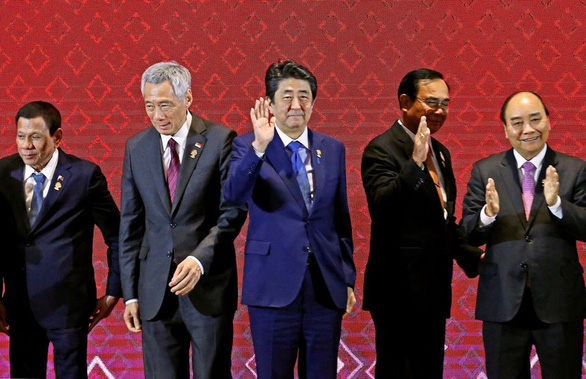Editor’s note: Former Japanese Prime Minister Shinzo Abe died in a hospital on Friday after being shot from behind by a man when he was delivering a speech on the street in Nara City, western Japan. Security officers arrested the suspect immediately at the scene. Abe was 67 years old.
The author of the following piece of writing is Stephen Nagy, senior associate professor at the Department of Politics and International Studies of International Christian College in Tokyo, Japan.
Former Prime Minister Shinzo Abe was known as a conservative politician who advocated amending Article Nine of the Japanese Constitution. This article dates back to the post-World War II era and explicitly prohibited Japan from using military force as an instrument of foreign policy.
As the longest-serving prime minister of modern Japan, Abe's legacy will be associated with proactive diplomacy that put Japan back on the geopolitical map by building strong relationships with the United States, India, Australia, Vietnam, Southeast Asia, Europe, and other countries based on his vision of a free and open Indo-Pacific region.
This vision focused on a rules-based approach to international affairs in the Indo-Pacific region, strengthening diplomatic engagement, development, infrastructure, and connectivity, and building common norms for negotiations and a shared vision of the Indo-Pacific region.
Whether it was Indian Prime Minister Narendra Modi or former Australian Prime Minister Scott Morrison, Presidents Barack Obama, Donald Trump, and Joe Biden, Prime Minister Abe was seen as an important, if not the quintessential, statesman in the Indo-Pacific region, representing stability, wisdom, and a vision for the region's development.
During his tenure as prime minister, Japan became known for its multidirectional diplomacy and invested significant resources in Southeast Asia and South Asia, as well as in multilateral organizations such as the Quadrilateral Security Dialogue (QSD).
Prime Minister Abe visited each Southeast Asian country more than once during his tenure. He worked to promote regional integration within ASEAN so that the bloc could function with more strategic autonomy over decisions in the [East Vietnam Sea] and throughout the region.
Like previous prime ministers, he deployed a tremendous amount of diplomatic and political capital to help Southeast Asian countries like Vietnam build their own capacity to manage their maritime space and also engage them in key trade agreements like the Trans-Pacific Partnership, which is now called Comprehensive and Progressive Agreement for Trans-Pacific Partnership (CPTPP).
Indeed, Abe saw countries like Vietnam, Indonesia, and Singapore as important allies in building a free and open Indo-Pacific vision that is based on common interests to ensure peace and stability in the region.
At home, he sought to revitalize the Japanese economy through quantitative easing and deregulation under the umbrella of Abenomics, which he succeeded in doing until his early resignation from the prime minister's office due to gastrointestinal problems in August 2020.
His Abenomics gained momentum and received quality support from economists and others until the pandemic that originated in Wuhan, China wiped out much of the momentum associated with Abenomics.
Importantly, Prime Minister Abe, despite his conservative background and strong position toward China's assertive behavior in the Indo-Pacific region, was responsible for bringing Japan-China relations back from the brink in 2019. This year, Prime Minister Abe visited Beijing for an Abe-Xi summit that resulted in more than 50 agreements to build infrastructure and connectivity projects in third countries across the Indo-Pacific region.
He also concluded numerous business agreements with China, recognizing that Japan's sustainable economic future is tied to a balanced, sustainable, but strong relationship with China.
Had the COVID 19 pandemic not broken out in January 2020, we would likely have seen a fifth policy document signed between Japanese Prime Minister Abe and Chinese President Xi Jinping. The fifth political document was the framework for how the two countries would shape their bilateral relationship over the next 10 years.
Prime Minister Abe was considered an experienced statesman who had the uncanny ability to work with President Trump as well as other leaders in Europe, North America, Southeast Asia, and South Asia.
His resignation from the prime minister's office in August 2020 was lamented by many heads of state, and his death on July 8, 2022 will be seen by many heads of state as a day of reflection and contemplation. Prime Minister Abe was seen as an experienced statesman who had a vision for the region, who understood how balanced Japan should be in working with China, but who at the same time drew clear red lines.
At the time this article is written, there is no way to assess the consequences of his death. For Japanese politics, Japanese citizens are likely to become much more aware of the fragility of their local and international security as Abe's assassination shakes the domestic view that Japan's stability and political sustainability are assured through consensus-based decision-making.
In the days and months ahead, we will see Japanese politicians and citizens lament the loss of their longest-serving prime minister. At the same time, we will see political opportunism on both the left and the right attempt to shape a prime minister who will leave other lasting marks. What is clear is that Abe’s foreign policy legacy will be marked by his proactive advocacy for a free and open Indo-Pacific region where rules-based order, good governance, development, and engagement are paramount. Importantly, he also championed not only Japan's security in the Indo-Pacific region but also the security concerns of the regional stakeholders.





















































